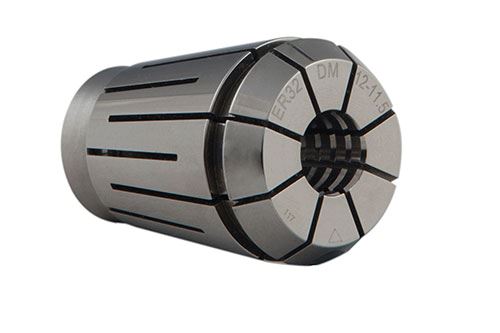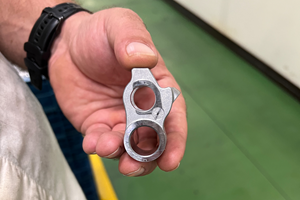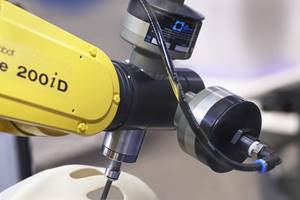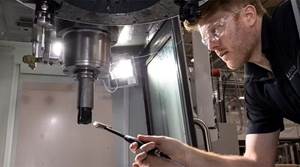Expanded Anti-Pullout System Enables Secure Titanium Milling with ER Collet Systems
Because of the extreme forces involved in machining titanium and other hard metals, it is necessary to take precautions to avoid pullout—the tendency for a cutting tool such as an end mill to gradually loosen in its holder and possibly be twisted out entirely.
Share





Because of the extreme forces involved in machining titanium and other hard metals, it is necessary to take precautions to avoid pullout—the tendency for a cutting tool such as an end mill to gradually loosen in its holder and possibly be twisted out entirely. Pullout creates a hazardous situation for the operator, the machine and the workpiece. In the case of large, complex titanium workpieces, damage from a loose cutting tool can be costly. Risk of injury to an operator is certainly an even more compelling concern.
Rego-Fix (Indianapolis, Indiana) has expanded its Securgrip anti-pullout toolholding system so that it can be used with toolholders accepting ER 32- and ER 40-style collets. When originally introduced, the Securgrip system offered specially designed collets compatible with its Powrgrip mechanical toolholding system. These collets provide an extra margin of tool clamping security by locking the collet and cutter to the toolholder via a small, profiled, locking key insert that fits into a standard Weldon end mill flat. This method helps counter pullout tendencies during milling of materials in which optimal machining parameters produce high torque forces on the cutter. Titanium, for example, usually requires an aggressive depth of cut at relatively slow spindle speeds to “bite into” this material for productive metal removal.
The outer profile of the hardened steel Securgrip insert has ridges that are essentially segments of a thread pattern. The back side of the insert profile matches that of the Weldon flat, and the thread pattern on its exposed side matches those of internally threaded Powrgrip system collets. Users hold the insert in place while sliding the tool into the collet. The collet is turned so that its threads engage with those of the insert, and the tool is then screwed all the way into the collet. In operation, the rotation of the spindle and the threads turn in the same direction, thus pushing the tool against the built-in back-up screw.
This cutter-collet assembly is pressed into a Powrgrip system holder, and a special external cap nut is tightened onto the holder for added pullout security. The expanded Securgrip system now applies this internal thread form to ER collets available from the company, enabling a standard colleted toolholder to attain the same level of secure gripping.
Currently, other anti-pullout systems exist in the market. What sets the system from Rego-Fix apart is that it does not require custom modifications to the tool shank, says David McHenry, senior product engineer. Such custom modifications require the cutting tool supplier to obtain a license to adopt the proprietary geometry of an anti-pullout system, which can add cost and delays to cutting tool procurement. The Securgrip enables the use of any off-the-shelf cutting tool with a common standard Weldon flat on its shank.
Users of the expanded collet system must make a one-time investment in the special ER collets with the matching Securgrip internal thread form, however. The system is designed to enable shops to use their existing ER holders and ER nuts. The system works with standard carbide or high speed steel end mills 0.5 to 0.79 inch (12.7 to 20 mm) in diameter, and provides TIR of 0.0002 inch or better, the company says. A backscrew enables presetting of tool length. The locking inserts are sized specifically for the shank diameter. The system is applicable for use with ER 32 or ER 40 holders in all tapers, including CAT, BT, TC, HSK, and Capto, as well as Rego-Fix 0.75-, 1.0- and 1.25-inch milling chucks in CAT, BT and HSK tapers.
Shops participating in the highly competitive field of machining titanium aerospace parts can justify the investment in machine tools with the rigidity and high horsepower at low rpms suitable for titanium. Effective anti-pullout measures ensure that these shops do not have to retreat from the optimum machining parameters these machines can deliver because of concerns about the security of the cutting tools and toolholder assembly.
Related Content
Custom PCD Tools Extend Shop’s Tool Life Upward of Ten Times
Adopting PCD tooling has extended FT Precision’s tool life from days to months — and the test drill is still going strong.
Read MoreFinding the Right Tools for a Turning Shop
Xcelicut is a startup shop that has grown thanks to the right machines, cutting tools, grants and other resources.
Read MoreHow to Accelerate Robotic Deburring & Automated Material Removal
Pairing automation with air-driven motors that push cutting tool speeds up to 65,000 RPM with no duty cycle can dramatically improve throughput and improve finishing.
Read MoreHow to Mitigate Chatter to Boost Machining Rates
There are usually better solutions to chatter than just reducing the feed rate. Through vibration analysis, the chatter problem can be solved, enabling much higher metal removal rates, better quality and longer tool life.
Read MoreRead Next
5 Rules of Thumb for Buying CNC Machine Tools
Use these tips to carefully plan your machine tool purchases and to avoid regretting your decision later.
Read MoreRegistration Now Open for the Precision Machining Technology Show (PMTS) 2025
The precision machining industry’s premier event returns to Cleveland, OH, April 1-3.
Read MoreBuilding Out a Foundation for Student Machinists
Autodesk and Haas have teamed up to produce an introductory course for students that covers the basics of CAD, CAM and CNC while providing them with a portfolio part.
Read More


.jpg;width=860)





















.png;maxWidth=300;quality=90)







